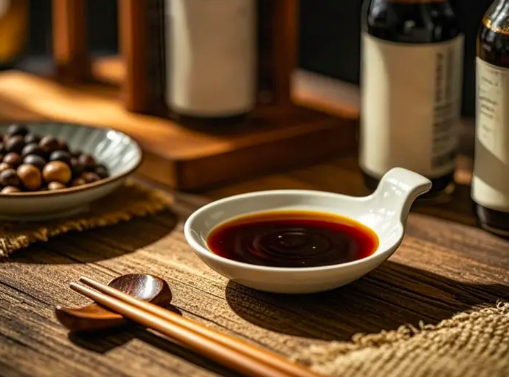目录
ToggleBlack rice vinegar and rice vinegar are both popular ingredients in Asian cuisine, celebrated for their distinctive flavors and uses. However, while they share some similarities, black rice vinegar and rice vinegar are not the same. Understanding their differences and applications can greatly enhance culinary practices and appreciation for these traditional condiments.

What is Black Rice Vinegar?
Black rice vinegar is a type of vinegar that originates from China, particularly from regions like Shanxi, Zhenjiang, and Sichuan. It is made from black glutinous rice, also known as sticky rice, and sometimes other grains like wheat and sorghum. The fermentation process for black rice vinegar can take several months, resulting in dark-colored, rich, and complex-flavored vinegar.
- Production Process: The process starts with soaking the black rice, which is then steamed and mixed with yeast and other fermenting agents. This mixture undergoes a fermentation process that can last for months, allowing the vinegar to develop its characteristic deep color and bold flavor. The final product is aged in clay pots, further enhancing its taste.
- Flavor Profile: Black rice vinegar has a rich, malty flavor with a hint of sweetness and umami. It is less acidic than other types of vinegar, making it a versatile ingredient in various dishes, including stir-fries, marinades, and dipping sauces.
- Nutritional Benefits: Black rice vinegar is believed to have several health benefits, including aiding digestion, reducing cholesterol levels, and providing antioxidants. The fermentation process also contributes to the presence of beneficial probiotics.
What is Rice Vinegar?
Rice vinegar, on the other hand, is made from fermented rice or rice wine. It is commonly used in Japanese, Korean, and Chinese cuisines, with each culture having its variations. Rice vinegar is known for its mild flavor and slight sweetness, making it an essential ingredient in dishes like sushi, salads, and pickles.
- Production Process: The production of rice vinegar involves fermenting rice into alcohol, which is then further fermented into acetic acid. This process creates a clear or pale yellow vinegar with a gentle acidity and subtle sweetness.
- Flavor Profile: Rice vinegar has a light, delicate flavor compared to black rice vinegar. Its mild acidity and touch of sweetness make it an excellent choice for dressings, pickling, and enhancing the natural flavors of various dishes.
- Nutritional Benefits: Rice vinegar is also known for its health benefits, including improved digestion and a boost to the immune system. It is lower in calories compared to other vinegar and contains trace amounts of amino acids and vitamins.
Differences Between Black Rice Vinegar and Rice Vinegar
While both black rice vinegar and rice vinegar are made from rice, their production methods, flavors, and uses differ significantly.
- Color and Appearance: Black rice vinegar is dark and opaque, while rice vinegar is typically clear or light yellow.
- Flavor: Black rice vinegar has a rich, robust flavor with a hint of sweetness and umami, whereas rice vinegar has a milder, slightly sweet, and acidic taste.
- Acidity: Black rice vinegar is less acidic than rice vinegar, which can affect how they are used in cooking. The lower acidity of black rice vinegar makes it suitable for richer, heartier dishes, while the higher acidity of rice vinegar makes it ideal for lighter dishes and pickling.
- Uses: Black rice vinegar is commonly used in Chinese cuisine for braising, dipping sauces, and marinades. Rice vinegar is more versatile across different Asian cuisines and is often used in sushi, salad dressings, and pickling.
How Black Rice Vinegar is Made
The making of black rice vinegar involves a detailed and time-consuming process that contributes to its unique flavor and characteristics:
- Raw Material Selection: High-quality black glutinous rice is selected and soaked in water to prepare it for fermentation.
- Steaming and Fermentation: The soaked rice is steamed to a specific texture and then mixed with yeast and other fermenting agents. The mixture is allowed to ferment in a controlled environment, developing the vinegar’s complex flavors.
- Aging: After fermentation, the vinegar is aged in clay pots, which adds depth to its flavor and enhances its nutritional profile.
In conclusion, while black rice vinegar and rice vinegar both originate from rice, their differences in production methods, flavors, and applications make them unique. Understanding these distinctions can help chefs and home cooks alike make informed decisions in their culinary endeavors. Whether you are using black rice vinegar for a rich, savory dish or rice vinegar for a light, refreshing salad, both types of vinegar offer distinct advantages and enrich the flavors of your meals.
0







